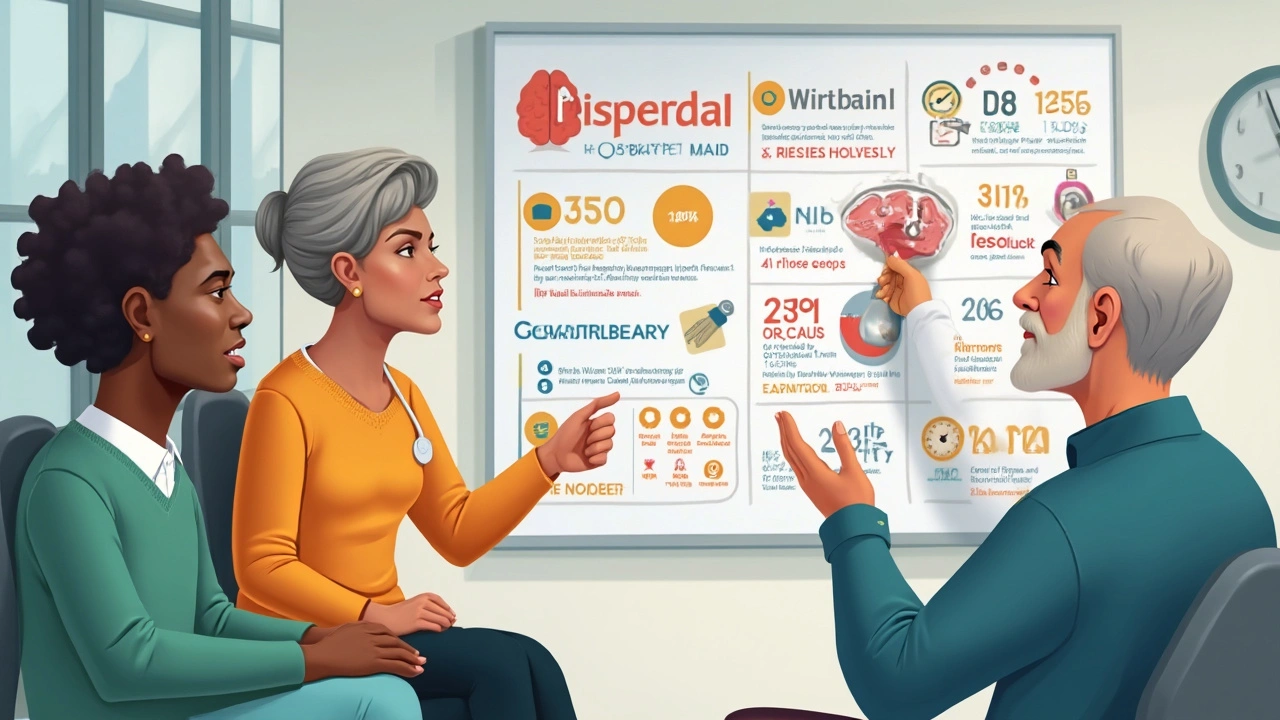Imagine having a medication that holds the power to dial down the noise in your mind or smooth out the rollercoaster of emotions. Risperdal, a brand name for risperidone, is known for doing just that for thousands of people around the world, especially those with mental health challenges like schizophrenia, bipolar disorder, or certain severe behavioral issues. But behind the pharmacy counter, it’s so much more than just another pill. It stirs up fierce debates, draws both hope and concern, and leaves many people wondering if the benefits outweigh the risks. If you’ve heard stories about Risperdal, or you’re facing the question of whether it’s the right fit, you’re not alone. From game-changing successes to controversial legal headlines, Risperdal isn’t just a medical name — it’s a conversation starter, a lifeline, and, for some, a cautionary tale.
How Risperdal Works in the Brain
Risperdal is part of a group of medications known as "atypical antipsychotics." That just means it’s newer and supposed to come with fewer movement-related side effects than older drugs. The main trick behind Risperdal is how it influences neurotransmitters — the brain's chemical messengers. In people with certain mental health conditions, these chemicals can be seriously out of balance. Risperdal mainly blocks two types: dopamine (which, when excessive, can cause symptoms like hallucinations or paranoia), and serotonin (which affects mood, anxiety, and sleep). By toning down the action of these chemicals, Risperdal helps keep mood, behavior, and thoughts on a steadier track.
Unlike first-generation antipsychotics that often left people feeling sluggish and robotic, Risperdal was designed to reduce those complications. It targets specific dopamine pathways while sparing others, so the classic "zombie" feeling is usually less intense — though it's not entirely out of the picture. Scientists are still piecing together why some people have remarkable responses while others don’t, but it’s clear Risperdal can be a game-changer for certain symptoms. Having said that, because the brain’s chemical network is so complex, any drug that tweaks neurotransmitters can come with side effects, from weight gain and restlessness to movement issues in rare cases. This chemical balancing act is exactly why doctors are careful about the dose and regular checkups.
Kids and teens with irritability related to autism, and older adults in nursing homes dealing with agitation, have both seen uses for Risperdal. That’s not always straightforward — while it sometimes helps manage tough symptoms, it’s vital to remember doctors weigh the risks very seriously, especially for younger or frailer patients. Before hitting the pharmacy, folks often ask, does Risperdal cure conditions like schizophrenia or bipolar disorder? The short answer is no. It helps manage symptoms, not the root cause. For many, it’s a tool, not a solution by itself, and it almost always works best when combined with therapy and personal support.
Still, even today, scientists don’t know everything about how risperidone works or why it sometimes triggers unexpected effects. The brain is that complicated. And even with all our progress, the medication world is full of trade-offs — you reduce risks in one area, sometimes new concerns pop up elsewhere. The key is understanding both the science and the real-life experience so you can make the most informed choices for your health or a loved one’s.
Who Gets Prescribed Risperdal—and Why?
Doctors reach for Risperdal in several major situations, usually after talking through the options with a patient and sometimes their family. It’s often given to people with schizophrenia, a mental health condition marked by hallucinations (like hearing voices), delusions, and confused thinking. For many adults, Risperdal helps lower the volume on these symptoms, sometimes making the difference between independent daily living and constant hospital visits. It’s also prescribed for bipolar disorder, especially when someone is cycling through super-high mood swings (mania) or is deeply depressed. For some, it helps flatten those severe ups and downs so life isn’t so unpredictable.
Children and teens with autism may get Risperdal to help with irritability, serious tantrums, or self-injury, especially if these behaviors make daily life unsafe or unmanageable. Unlike many medications that haven’t been studied as much in young people, risperidone is one of the only antipsychotics officially approved for certain challenging behaviors linked to autism in children as young as five. That said, doctors are usually careful to try other approaches first (like therapy or behavioral plans) because of the possible side effects.
Older adults sometimes receive Risperdal—usually off-label—for agitation linked to dementia or Alzheimer's disease, particularly if someone is aggressive or so distressed it puts them or others at risk. But this use is pretty controversial. The FDA has actually put a "black box" warning on the label, citing increased risk of death in elderly dementia patients. So doctors tread really carefully here — only using risperidone if nothing else will work, and always with close monitoring.
- Here’s a quick table to show who’s most often prescribed Risperdal, what for, and the age groups:
| Condition | Age Group | Goal |
|---|---|---|
| Schizophrenia | Teens–Adults | Control psychosis, reduce delusions/hallucinations |
| Bipolar Mania/Mixed Episodes | Children (10+)–Adults | Stabilize extreme mood swings |
| Autism-Related Irritability | Children (5+)–Teens | Lower aggression, tantrums, self-harm |
| Agitation in Dementia | Older Adults | Calm severe behavior issues (cautiously, off-label) |
Sometimes, doctors will prescribe Risperdal "off-label" for other problems, like some symptoms of PTSD or even severe anxiety when nothing else seems to work. When this happens, they’re always weighing possible benefits against the risks, because Risperdal isn’t a trivial medication. The question is always: will it help more than it could possibly hurt?
In all these scenarios, no one-size-fits-all approach exists. Some people notice relief within a week or two; others need longer and dose changes to find their sweet spot. Life events, stress, age, or even pregnancy can change how effective and safe the drug feels. Close partnerships between patients, families, and medical providers help everyone stay tuned in to the real goals—feeling better safely, not just ticking a box on a prescription form.

Side Effects and Safety: What the Research Says
No medication works in a vacuum, and Risperdal has a reputation for causing both mild and sometimes worrisome side effects. Let’s get brutally honest: the most common ones make people uncomfortable, but they’re not usually dangerous. We’re talking weight gain, daytime sleepiness, and hormonal shifts (like increased prolactin), which sometimes lead to things like unexpected breast development (known as gynecomastia) in boys or women, and missed periods. Some people get headaches, feel restless, or have an upset stomach. Others notice mild tremors, or their blood sugar or cholesterol starts to creep up. According to a 2023 meta-analysis published in The Lancet Psychiatry, about 1 in 3 users will deal with significant weight gain, and 10% may see some hormonal changes, especially at higher doses.
The more serious risks usually show up less often but are the reason doctors are so careful — especially with children, teens, and older adults. There’s a small but real chance of developing movement disorders like tardive dyskinesia (involuntary twitching or face/body movements) or neuroleptic malignant syndrome (a rare but dangerous reaction marked by high fever and muscle rigidity). Sadly, elderly dementia patients face an increased risk of stroke and death with antipsychotics, so any use in this group is heavily scrutinized. “These medicines can be truly helpful, but every dose is a balancing act. We have to keep listening to the patient, their body, and their mind,” says Dr. Mark Olfson, professor of psychiatry at Columbia University.
Managing side effects is about paying attention to what’s new or different in your body. People taking Risperdal often benefit from straightforward, practical steps like:
- Tracking weight, waist size, and appetite weekly for the first couple of months.
- Getting regular blood tests to check cholesterol and blood sugar, especially for those with family history of diabetes.
- Staying in touch with your doctor if you notice twitching, weird muscle stiffness, or new rashes.
- Asking about dose adjustments when daytime sleepiness, dizziness, or hormonal issues pop up.
Some side effects go away on their own, while others need specific actions—like changing the dose, adding medicines for certain problems (ex: metformin for weight gain), or sometimes switching to a different medication if things don’t improve. And here’s a tip: avoid suddenly stopping Risperdal, because withdrawal can cause symptoms to bounce back fast, or new ones to start. Always work with your doctor on a slow, safe plan if the medication needs to be stopped or swapped.
For anyone still weighing the pros and cons, here’s the short version: Risperdal’s benefits can be life-changing for some, but side effects are real and should never be minimized. The smart move is to stay honest with yourself and your healthcare provider about any changes you feel, even the ones that seem minor.
Risperdal in the Headlines: Lawsuits and Controversies
Risperdal has made its way into national news for reasons that go way beyond ordinary medication management. Over the past decade, pharmaceutical giant Johnson & Johnson faced several huge lawsuits connected to the drug, mostly regarding how it was promoted and the risks reported (or not reported) to the public. In 2013, the company paid more than $2.2 billion to settle claims that they had marketed risperidone for unapproved uses in children and the elderly—especially targeting vulnerable folks who might not have been protected by existing safety studies. The lawsuits also focused on the risk of boys and male teens developing gynecomastia (breast tissue growth), a side effect that some argued wasn’t properly highlighted to doctors or families early on.
These legal battles left a mark. They highlighted gaps between pharmaceutical marketing, real-life usage, and the importance of honesty and transparency around medication risks. “Transparency protects patients, so everyone knows what they’re getting into before they take a drug like Risperdal,” said attorney Thomas Kline, who represented families in one of the landmark cases. The lawsuits also spurred more rigorous warning labels, tighter FDA rules, and stronger policies about which patients can safely use this medication.
But the controversy isn’t just about big corporations. Stories from actual patients and their families reveal very real struggles and mixed emotions. Some say Risperdal offered a rare lifeline when nothing else worked; others wish they had been warned better about side effects that altered their lives. The truth is, doctors everywhere learned from the past decade’s headline-grabbing moments. These days, conversations about Risperdal are usually much more direct and cautious. Most providers offer detailed info on all possible pros and cons—including those rare side effects—before anyone fills that first prescription.
Still, stories travel fast. If you Google Risperdal, you’ll find everything from personal blogs and YouTube updates to clinical trial results and courtroom news clips. It’s normal to get overwhelmed. But reading peer-reviewed studies, talking with licensed healthcare providers, and connecting with real-world support groups is always more useful than getting lost in rumors or worst-case scenario headlines.
Here’s a simple rule: trust but verify. Whenever you hear claims about the dangers or miracles of Risperdal, ask for the facts, look for evidence-backed sources, and check with professionals before making decisions. As someone once said, “every medicine comes with a price — but we’re all entitled to good information before we pay it.”

Practical Tips: Getting the Most Out of Risperdal Safely
So, let’s get down to earth for a second: if Risperdal is on the table for you or someone you love, how do you really make the best of it? First, know that the dosing is all about "start low, go slow." Most doctors will pick the lowest effective amount and only ramp up if absolutely needed. If you’re starting out, keep a daily journal of how you feel—note the changes in your mood, thinking, appetite, sleep, and energy level. Even subtle shifts matter. Bring that log to every doctor appointment.
Risperdal comes as tablets, liquid (oral solution), and an injectable (long-acting) version given every two weeks. Tablets and liquid are usually taken once or twice a day, with or without food. Try to keep the schedule consistent. If a dose is missed, don’t double up—just take the next one as planned and let your provider know. And yes, the injectable (called Risperdal Consta) is often chosen for people who have a tough time remembering daily medicine or whose symptoms make regular routines tricky.
- Never mix Risperdal with other medications or supplements unless your doctor signs off. Lots of stuff can raise or lower risperidone’s level in your body—and you don’t want to mess around with that.
- Be honest about alcohol, weed, or other drugs. Risperdal can make sedation worse and cloud judgment, so combining substances can be flat-out risky.
- If you’re pregnant, breastfeeding, or planning to be, talk openly with your healthcare team. Risperdal passes into breast milk and may not be safe for the fetus or baby.
- If you see signs like sudden severe muscle stiffness, confusion, a high fever, or uncontrolled facial movements, get medical help fast—these can be red flag emergencies.
- Bring someone you trust to appointments. Between side effect monitoring and remembering questions, a friend or family member makes a huge difference.
And don’t forget about mental health support beyond pills. Risperdal is most effective when combined with therapy, healthy sleep routines, balanced nutrition, and movement. Stress, lack of sleep, and sudden life changes can all shift how the medicine works—so the healthiest routines support the best results.
Looking for support? National organizations like NAMI (National Alliance on Mental Illness) run helplines, local classes, and online forums where people trade tips beyond just medicine. There’s power in connecting with others who “get it.”
If you or anyone you know is suffering or worried about side effects, never struggle in silence. Honest, ongoing communication with healthcare providers is the real nonnegotiable. Medications like Risperdal can make enormous positive differences when used wisely—so be persistent, ask questions, and remember your story matters as much as any study or statistic.








Posts Comments
Mira Adam June 15, 2025 AT 22:21
Risperdal is just chemical suppression dressed up as care. They don't cure anything-they just mute the person until they stop screaming. Where's the therapy? Where's the human connection? We've turned minds into machines that need firmware updates.
Miriam Lohrum June 17, 2025 AT 06:11
It's fascinating how we treat the brain like a broken radio. We tweak neurotransmitters like dials on a stereo, hoping to get the right station. But consciousness isn't a signal-it's a symphony. And no pill can conduct that.
archana das June 17, 2025 AT 08:28
In India we have yoga, meditation, herbal teas, and family who actually sit with you. But when the system fails, even here people turn to pills like Risperdal. It's not magic-it's just the only thing the hospital has time to give.
Rhiana Grob June 18, 2025 AT 08:34
While the medical literature provides clear guidelines on dosing and monitoring, the human element remains critically underemphasized. The patient’s lived experience-especially regarding weight gain, hormonal changes, and emotional flattening-must be prioritized in clinical decision-making. This is not merely pharmacology; it is ethics in action.
Edward Batchelder June 18, 2025 AT 11:24
Let me be very clear: Risperdal is not a cure. It is a tool. And like any tool, it can be used well or abused. The lawsuits? They happened because profit was prioritized over people. But for many families? It’s the only thing that kept their child from hurting themselves. Don’t throw the baby out with the bathwater.
reshmi mahi June 19, 2025 AT 23:06
USA again with their pill-fix-everything culture 😂 In India we just tell the kid to sit quietly and eat more turmeric. Risperdal? More like Risper-Dollar.
laura lauraa June 21, 2025 AT 10:51
It's not just the gynecomastia, the weight gain, the metabolic syndrome-it's the quiet erasure of self. You're not 'stabilized'; you're numbed. And then you're told you're 'doing better.' Better for whom? The system? The insurance company? The doctor's quarterly metrics? You're not a patient-you're a data point with a pulse.
Gayle Jenkins June 21, 2025 AT 16:29
My cousin started Risperdal after years of hospitalizations. Within two weeks, he stopped hitting walls. He started making eye contact. He smiled. Yes, he gained weight. Yes, he was sleepy. But he was alive. And that’s more than we had before. Don’t shame people for surviving.
Kaleigh Scroger June 22, 2025 AT 12:11
One thing nobody talks about is how long it takes to get the dose right. Some people need 0.5mg for a month just to see if it's tolerable. Others jump to 4mg in two weeks because the doctor is in a rush. And then the side effects hit and everyone blames the drug. It's not the drug it's the dosing protocol and the lack of follow-up. Also the fact that primary care docs prescribe this now instead of psychs. Big problem
Allison Turner June 23, 2025 AT 04:12
So what? It's a drug. It has side effects. People take antidepressants and gain weight. People take Adderall and lose their appetite. This isn't special. Stop acting like it's a conspiracy. If it helps someone function, use it. If it doesn't, stop. Simple.
Darrel Smith June 24, 2025 AT 17:41
My brother took this for three years and became a ghost. He didn't laugh anymore. He didn't cry. He just sat. And the doctors kept saying 'it's working.' Working? Working for who? The system that doesn't want to pay for real therapy? The pharmaceutical reps who got bonuses for prescriptions? This isn't medicine-it's industrialized soul-crushing.
Aishwarya Sivaraj June 25, 2025 AT 09:47
i took risperdal for 6 months after my dad died i wasnt sleeping and i was hearing voices i know it sounds crazy but i was so lost and it helped me come back to myself i gained weight yes but i also got to hold my niece for the first time in a year and she smiled at me and i cried and that was worth it
steve stofelano, jr. June 25, 2025 AT 11:03
It is imperative to underscore the necessity of multidisciplinary oversight when prescribing antipsychotic pharmacotherapy. The integration of psychiatric, endocrinological, and nutritional monitoring protocols is not ancillary-it is foundational to ethical clinical practice.
Cecily Bogsprocket June 25, 2025 AT 16:10
I’ve seen people on Risperdal come alive again-not because they’re numb, but because the noise finally stopped. I’ve also seen people lose themselves in it. It’s not the drug’s fault. It’s the lack of support around it. A pill can’t replace a community. But it can buy you the time to find one.
Emma louise June 26, 2025 AT 15:45
Oh wow, another article pretending Risperdal isn’t just a chemical lobotomy for inconvenient people. Let’s not forget the kids in foster care who were drugged to make them ‘manageable.’ And the elderly in nursing homes who were given this so staff could have an easier shift. This isn’t medicine-it’s social control with a prescription pad.
Emma Dovener June 27, 2025 AT 08:32
For those considering Risperdal: track everything. Weight, sleep, mood, energy. Bring your logs to every appointment. Ask about alternatives like aripiprazole or lurasidone-they have different side effect profiles. And if your doctor won’t spend 20 minutes explaining risks? Find another one. You deserve that.
Write a comment